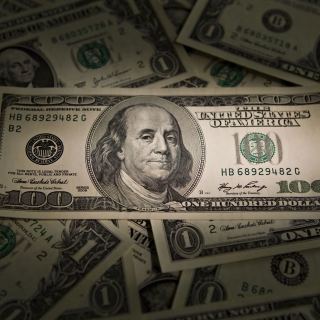


The dollar fell to a two-week low on Wednesday after a tame reading on U.S. inflation bolstered expectations of a Federal Reserve rate cut next month, with President Donald Trump's attempts to extend his grip over U.S. institutions also undermining the currency.
The dollar index, measuring the currency against a basket of peers, fell to 97.62, its lowest since July 28, extending its 0.5% fall on Tuesday. It was last down 0.3% at 97.70.
U.S. consumer prices increased marginally in July, data showed on Tuesday, in line with forecasts and as the pass-through from Trump's sweeping tariffs to goods prices has so far been limited.
Investors eyeing imminent Fed cuts moved to price in a 98% chance the central bank would ease rates next month, according to LSEG data.
Also eroding investor confidence in the dollar were Trump's latest attempts to undermine Fed independence, after White House spokeswoman Karoline Leavitt said on Tuesday that the president was considering a lawsuit against Fed Chair Jerome Powell in relation to his management of renovations at the central bank's Washington headquarters.
Trump has been at loggerheads with Powell and has repeatedly lambasted him for not easing rates sooner.
Michael Pfister, FX analyst at Commerzbank, said these political developments carried echoes of autocratic countries, where heads of statistics agencies or central banks are replaced and critical data series often discontinued or manipulated.
"I'm not saying that this will necessarily happen here. But the developments of the last few days and weeks do not exactly fill me with optimism about the future, or the U.S. dollar," Pfister said.
Trump also hit out at Goldman Sachs CEO David Solomon, saying the bank had been wrong to predict U.S. tariffs would hurt the economy. Trump questioned whether Solomon should lead the Wall Street institution.
Elsewhere, the dollar's weakness supported the euro (EUR=EBS) and sterling. The single currency was last up 0.4% to $1.1719, briefly hitting its highest since July 28. Similarly, the British currency rose 0.5% to $1.3570, briefly hitting its highest since July 24.
Britain's jobs market weakened again though wage growth stayed strong, according to data on Tuesday, underscoring why the Bank of England is so cautious about cutting interest rates.
The Australian dollar was up 0.4% to $0.6556, while the New Zealand dollar rose 0.6% to $0.5989.
The Reserve Bank of Australia on Tuesday cut interest rates as expected, and signalled further policy easing might be needed to meet its inflation and employment goals as the economy lost some momentum.
In cryptocurrencies, ether scaled a nearly four-year high of $4,710.
"Ethereum's quiet breakout is being fuelled by real-world adoption and capital confidence," said Gracie Lin, Singapore CEO of crypto exchange OKX.
"On our platform, ETH has now overtaken BTC as the most traded asset over the past month."
Source: Investing.com
The USD/CHF pair weakened for the third consecutive day and traded around 0.7960 in early European trading on Tuesday. The Swiss franc strengthened on increased demand for safe haven assets, following...
The US Dollar Index (DXY) trended sluggishly around 99.06 on Monday (January 19th), as liquidity thinned as US markets were closed for Martin Luther King Jr. Day. Despite limited movement, global sent...
The US dollar is expected to rise for a third straight day on Thursday (January 8), but trading remains cautious as investors position themselves ahead of Friday's Nonfarm Payrolls (NFP) report. Recen...
The dollar index edged up to 98.5 on Tuesday, its strongest level in more than two weeks, as investors focused on a slate of key economic data for the US. Recent indicators have pointed to some soften...
The US dollar opened 2026 weakly on Friday. Throughout last year, the dollar was pressured by many major currencies due to narrowing interest rate differentials between the US and other countries. Con...
Gold prices briefly caused a stir after hitting a new record, but then slowed. The main trigger: US President Donald Trump withheld the threat of tariffs on Europe and claimed there was a "framework" for a future agreement on Greenland. This calmer...
Oil prices were little changed in Asian trading on Thursday after US President Donald Trump backed down from a threat to impose tariffs on European countries over Greenland. This decision helped ease geopolitical tensions and improve market...
The Nikkei 225 Index climbed 1.73% to close at 53,689, while the broader Topix Index rose 0.74% to 3,616 on Thursday, snapping a five-day losing streak as Japanese shares were lifted by a strong rally in chip and artificial intelligence related...